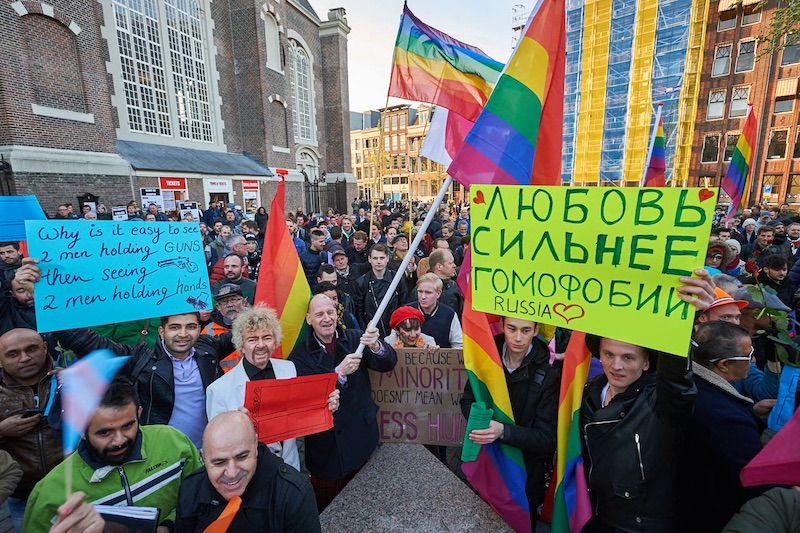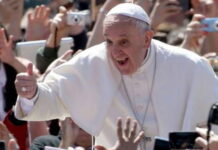A protest on LGBTQ rights in Russia – Photo: Russian LGBT Network.
” data-medium-file=”https://i0.wp.com/www.metroweekly.com/wp-content/uploads/2020/09/Russian-LGBT-protest.jpg?resize=300%2C194&ssl=1″ data-large-file=”https://i0.wp.com/www.metroweekly.com/wp-content/uploads/2020/09/Russian-LGBT-protest.jpg?fit=800%2C533&ssl=1″ decoding=”async” class=”size-full wp-image-186701″ src=”https://i0.wp.com/www.metroweekly.com/wp-content/uploads/2020/09/Russian-LGBT-protest.jpg?resize=800%2C533&ssl=1″ alt width=”800″ height=”533″ srcset=”https://i0.wp.com/www.metroweekly.com/wp-content/uploads/2020/09/Russian-LGBT-protest.jpg?w=800&ssl=1 800w, https://i0.wp.com/www.metroweekly.com/wp-content/uploads/2020/09/Russian-LGBT-protest.jpg?resize=768%2C512&ssl=1 768w, https://i0.wp.com/www.metroweekly.com/wp-content/uploads/2020/09/Russian-LGBT-protest.jpg?resize=300%2C200&ssl=1 300w” sizes=”(max-width: 800px) 100vw, 800px” data-recalc-dims=”1″>
The Russian State Duma, or lower house of parliament, has approved and advanced a bill to expand Russia’s existing “gay propaganda” law to apply to people of all ages.
The existing law, adopted in 2013, purports to ban. the spread of “propaganda of nontraditional sexual relations” among minors under the guise of protecting them from being exposed to any information that is either facially neutral concerning homosexuality or depicts LGBTQ individuals in a positive light.
Individuals found to have violated the new expanded law will be fined up to 400,000 rubles, or $6,600 in U.S. dollars per offense, with legal entities being fined up to 5 million rubles, or $82,100 in U.S. dollars. Foreigners found guilty of spreading or promoting such ideas or concepts can be arrested for up to 15 days or deported, reports CNN.
The law carries stiffer penalties for exposing minors to such information, though fines will still be levied against entities or individuals who seek to provide even basic information about homosexuality or gender identity, provide information about safe sex or gender-affirming care to LGBTQ individuals, or depict homosexuality as a valid “lifestyle.”
According to Human Rights Watch, the bill also seeks to link homosexuality and transgender identity with pedophilia, referring to “propaganda of nontraditional sexual relations and (or) preferences, pedophilia, and sex change.”
Websites and other online sources that contain information about the LGBTQ community can be blocked under the law. Under the law, there are no exceptions for art, scientific studies, or education, even when dealing with audiences solely comprised of adults.
“The 2013 ‘gay propaganda’ law was an unabashed example of political homophobia, and the new draft legislation amplifies that in broader and harsher ways,” Tanya Lokshina, the associated Europe and Central Asia director at the nonprofit Human Rights Watch. “Just as the original law resulted in significant stigma and harm toward LGBT people in Russia, this updated version will have an even more stifling effect on freedom of expression, well-being and security.”
The existing law has been used by the government to justify shutting down pro-LGBTQ organizations, blocking online access to media outlets, and banning LGBTQ-centric events, lest children be even indirectly exposed to, or made aware of, the existence of sexual minorities.
In 2018, the UN Human Rights Committee declared the law to be “ambiguous, disproportionate and discriminatory” and denounced the law’s “blanket restriction on legitimate expressions of sexual orientation.” The European Court of Human Rights issued similar conclusions, condemning the use of the law to shut down LGBTQ events or forcibly disband LGBTQ organizations.
In 2019, the court ordered Russia to pay approximately $41,000 in damages to LGBTQ groups who had been barred from registering as associations, finding that the law infringed upon the groups’ right to freedom of association.
In 2022, the UN Human Rights Committee reiterated its concerns about the law’s potential to discriminate against LGBTQ people, and urged Russian lawmakers to repeal the law, rather than expand it.
“This law — like its predecessor — doesn’t protect anyone, but seeks to stoke fear and hatred about a minority,” Lokshina, of Human Rights Watch, said in a statement. “The proposed legislation and the original ‘gay propaganda’ ban have no place in any society and belong in the trash.”
The law now heads to the Federation Council, the upper house of parliament, and, once approved, will be signed into law by President Vladimir Putin, who has used the law to curry favor with religious leaders and to distract from other political issues by accusing Western nations of seeking to undermine Russian society and families by promoting LGBTQ rights.









